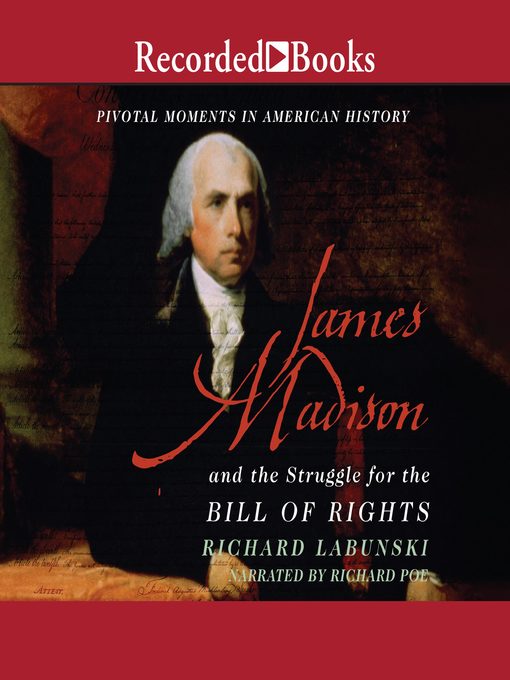
James Madison and the Struggle for the Bill of Rights
فرمت کتاب
audiobook
تاریخ انتشار
2008
نویسنده
Richard Poeناشر
Recorded Books, Inc.شابک
9781449801991
کتاب های مرتبط
- اطلاعات
- نقد و بررسی
- دیدگاه کاربران
نقد و بررسی

Shy, sickly, unprepossessing, and very young at the time, future President James Madison played a crucial role in shaping the American Constitution, which he advocated, and framing the Bill of Rights, which he initially opposed. This book exhaustively details the ideas, politics, and personalities that led to the adoption of the first 10 amendments and how Madison influenced them. The author apparently intends his 336 fact-filled pages for those wishing to drench themselves in the subject. With his clarion newscaster's voice, reliable Richard Poe protects the 11-plus-hour exegesis from dryness. His excellent phrasing provides additional clarity to an already-accessible text. Y.R. (c) AudioFile 2006, Portland, Maine

May 8, 2006
This engaging study views the Bill of Rights as the crowning achievement of America's constitutional architect. Journalism professor Labunski (The First Amendment Under Siege
) recounts Madison's exploits in the critical period from 1787 to 1789, as he battled anti-Federalist Patrick Henry to secure Virginia's ratification of the new Constitution, won a hard-fought election to the House of Representatives and shepherded the Bill of Rights through the fledgling Congress. Madison, the author argues, walked a tightrope between Federalists who dismissed a bill of rights as unnecessary, perhaps dangerous, window dressing, and anti-Federalists who clamored for one as a pretext to call a second constitutional convention to undo the first. Linking these events to Madison's biography, Labunski sometimes loses the narrative thread and analytical perspective in the clutter of Madison's existence, like his recurring bouts of diarrhea. Moreover, Labunski's "indispensable man" historiography downplays Madison's decidedly lukewarm attitude toward a bill of rights until popular pressure and political necessity forced him to embrace it. Still, the author makes it an interesting story, full of sonorous oratory and colorful details of 18th-century politicking. The result is a lively look at the rickety early republic and Madison's great balancing act. 20 b&w illus.

September 4, 2006
It will come as little surprise to learn that Poe is a veteran Broadway performer: in reading Labunski's chronicle of James Madison's efforts to ratify the Constitution and pass the Bill of Rights, his voice echoes with effortless assurance, carrying into the virtual back row of any room. Thankfully, Poe mostly avoids the vocal equivalent of theatrical preening and posing. His reading is careful, unassuming and avoids wholly unnecessary showboating. Labunski's narrative revolves around Madison's struggle with fellow Virginian Patrick Henry over ratification, and Poe does a fine job of conveying the steadily ratcheting tension of their battle. Poe colors Labunski's tale with an appropriate array of significant pauses, emphases and hushed mock-whispers, bringing his book to life without resorting to overworked theatrical tricks. He may be a stage veteran, but Poe's reading is anything but stagy. Simultaneous release with the Oxford hardcover (Reviews, May 8).

Starred review from May 1, 2007
This first-class look at the early evolution of the U.S. Constitution's Bill of Rights has several things going for it: it's superbly written, elaborates on personalities and physical ambiance as well as ideas, and features one of the most skilled narrators in the audiobook business, Richard Poe. The reading could have been as dry as dust, but Poe's intonation and timbre sound similar to that of Ronald Reagan, rightly called "the Great Communicator." Madisona shy and sickly Virginia politicianwas young when the Constitution emerged from convention and circulated among the states, igniting a vast firestorm of opinion, controversy, and abuse. Journalist Labunski details the evolution of Madison's thinking, which was at least as practical (to save the Constitution) as idealistic. A strong focus of the narrative is the confrontation in Virginia between the articulate and fiery orator of the day, the arch anti-Federalist Patrick Henry, and Madison and his cohorts, George Washington among them. This is a fascinating, lucid account of a fundamental political struggle that helped form the early Republic; highly recommended for academic and public library collections.Don Wismer, Cary Memorial Lib., Wayne, ME
Copyright 2007 Library Journal, LLC Used with permission.

























دیدگاه کاربران